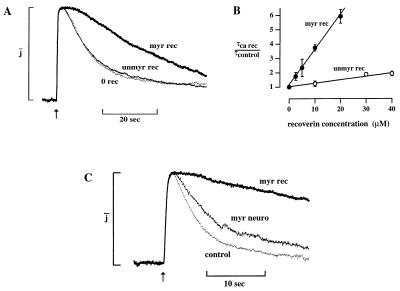Figure 7.
(A) Effect of myristoylation of recoverin. Flash response with no added recoverin (control, dotted trace), in 20 μM unmyristoylated recoverin (light trace), and in 20 μM myristoylated recoverin (bold trace). All responses at 30 μM Ca. Flash strength 346 photons/μm2. Time constants, τ, were (s): 9.1, control; 9.5, unmyristoylated; 54, myristoylated. Absolute amplitudes were (pA): 58, control; 72, unmyristoylated; 63, myristoylated. (B) Dependence of prolongation on Ca-recoverin concentration. Prolongation factor, τCa-recoverin/τcontrol, plotted as a function of concentrations of myristoylated (•) and unmyristoylated (○) forms. Collected results from 11 cells (myristoylated) and 8 cells (unmyristoylated). Ca concentration for Ca-recoverin solutions was 30 μM. The control was without recoverin at 30 μM Ca or with recoverin at 0.03 μM Ca (unmyristoylated) or 0.5 μM Ca (myristoylated). Points are means of at least three measurements, error bars SEM. The straight lines were determined by weighted least squares fit, with slopes of 0.024 ± 0.010 μM−1 (unmyristoylated) and 0.25 ± 0.05 μM−1 (SD) (myristoylated). The point at 0 μM recoverin was taken as 1 and assigned a weight consistent with the highest SD. (C) Effect of α neurocalcin, a recoverin homolog. Flash responses with no added protein (control, dotted trace), with 20 μM myristoylated α neurocalcin (thin trace) and with 20 μM myristoylated recoverin (bold trace), 30 μM Ca throughout. Flash strength 80 photons/μm2. Time constants, τ, were (s): 4.5, control; 9.0, neurocalcin; 37, recoverin. Absolute amplitudes were (pA): 38, control; 27, neurocalcin; 36, recoverin.

